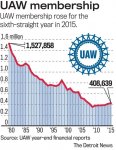- Joined
- Sep 3, 2010
- Messages
- 120,954
- Reaction score
- 28,531
- Gender
- Undisclosed
- Political Leaning
- Undisclosed
I realize Trump was not completely detailed about this idea - but - it was my impression that this 35% tariff was NOT going to be for foreign made products - but reserved for American companies who went elsewhere with those American jobs and now want to bring those products back here for sale. There is a difference in that and ALL foreign made products from a certain nation.

